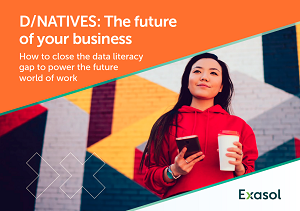In this contributed article, Christine Andrukonis, Workplace Transformation Expert and founder of Notion Consulting, believes that the ultimate goal of data literacy is to provide a framework for data-driven decision-making. Nothing is stopping you from developing a learning program that’s also fun, engaging, and beneficial to employees in all parts of their lives.
Get Lit: 5 Steps to Building your Organization’s Data Literacy as you Prep for AI
Data Literacy to be Most In-Demand Skill by 2030 as AI Transforms Global Workplaces
The report, Data Literacy: The Upskilling Evolution, was developed by Qlik in partnership with The Future Labs and combines insights from expert interviews with surveys from over 1,200 global C-level executives and 6,000 employees. The findings, which were largely consistent across all geographies surveyed, reveal how the rapid growth in data usage is extending enterprise aspirations for its potential and, in turn, transforming working practices.
Key Trends in 2022 for Organizations to Improve Data Literacy
In this sponsored post, our friends over at Trifacta suggest that intriguing data questions are inherently interdisciplinary. As business leaders look to data-driven decision-making in 2022 and beyond, they must continue to make strides organization-wide in data literacy, or even simply make more individuals comfortable with data. Ultimately, decision-makers need to interpret and use data in a meaningful way to drive the business forward.
2022 Trends in Data Strategy: A New Archetype
In this contributed article, editorial consultant Jelani Harper discusses how selecting the right data strategy that’s applicable to a specific organization is no longer a point of academic interest. Data strategy is the substrate upon which the very notion of data management, and all its dimensions, depends. Developments in this facet of the data sphere directly impact all others, from the rudiments of data governance to advanced analytics spurring time-sensitive action.
New Research Suggests Young Digital Natives Lack the Data Literacy Employers Crave — But Is It All a Big Misunderstanding?
Exasol, a leading high performance analytics database company, launched the findings of its new study into the attitudes and understanding that young people currently in higher education or just entering the world of work have towards data. The study of 3,000 16- to 21-year-olds (coined D/NATIVES by Exasol because of their everyday digital skills) finds that despite over half of respondents believing that their ability to understand data will be as vital to their future as their ability to read and write — only 43% actually consider themselves to be data literate.
Data Literacy: Making Society Fluent in Data
In the age of big data, data science, and AI, there is a broad ranged need for global data literacy. The time is near when national economies will be data-driven. Fortunately, a recent unveiling describes a timely resource to address this need. Qlik and The Data Literacy Project announced that they’ve partnered to launch a certification that lets individuals document and demonstrate their data literacy skills. Developed by leading academics and data literacy specialists at Qlik, this free, 70-question examination tests the ability to read, work with, analyze and argue with data.
New Research Uncovers $500 Million Enterprise Value Opportunity with Data Literacy
According to a major academic study commissioned by Qlik®, on behalf of the newly launched Data Literacy Project, large enterprises that have higher corporate data literacy experience $320-$534 million in higher enterprise value (the total market value of the business). Corporate data literacy is the ability of a company workforce to read, analyze, utilize for decisions and communicate data throughout the organization.







